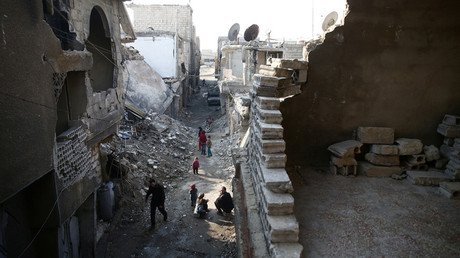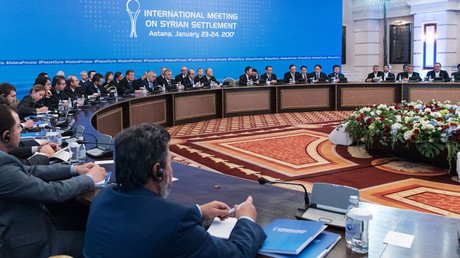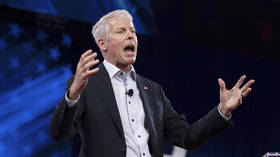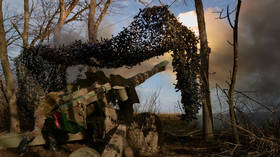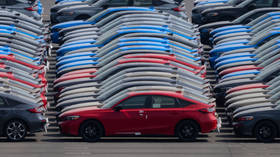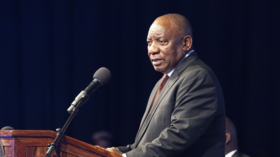‘Trump didn’t consult Moscow on Syria safe zone plan, should consider all consequences’ – Kremlin
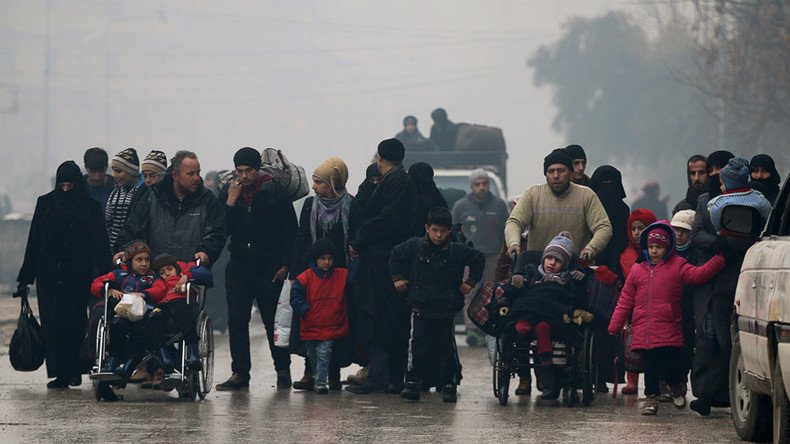
Moscow has reacted to Donald Trump’s plans on establishing ‘safe zones’ for Syrian refugees, with the Kremlin spokesman saying the question had not been raised with Russia, while also suggesting the US should consider the possible consequences of such a move.
“Our American partners did not consult with Russia [regarding the ‘safe zones’]. It is their sovereign decision,” Kremlin spokesman Dmitry Peskov told a conference call with reporters on Thursday.
He noted the importance of considering all the possible outcomes of taking such a step.
“It’s important to make sure that this does not further aggravate the situation with refugees. Evidently, all the possible consequences should be taken into account,” the spokesman said.
US President Trump said he would establish ‘safe zones’ in Syria for people fleeing terrorism.
“I’ll absolutely do safe zones in Syria for the people,” he said in a lengthy interview with ABC on Wednesday.
Trump also said Europe had been wrong to let in asylum seekers from the Middle East.
“I think that Europe has made a tremendous mistake by allowing these millions of people to go into Germany and various other countries.
“[…] It's a disaster what's happening over there [in Europe]. I don't want that to happen here [in the US],” he said.
He noted that his predecessor Barack Obama had also allowed thousands of refugees into the United States, saying this made terrorist attacks possible on US soil.
Trump vowed not to follow the policy of the Obama administration, accusing it of having been unable to properly check immigrants entering the US from Syria and other crisis-stricken states to make sure they had no links to terrorism.
READ MORE: Syrian Islamist rebels band together to repel hard-line jihadist attacks – report
“President Obama and [former Secretaries of State] Hillary Clinton… and [John] Kerry have allowed tens of thousands of people into our country. The FBI is now investigating more people than ever before having to do with terror […] and it's from the group of people that came in,” Trump stated.
According to a document reportedly seen by Reuters, Trump is expected to instruct the Pentagon and State Department to compile a plan for setting up the ‘safe zones’ within 90 days of the presidential order being signed. The draft, however, did not provide any details on what the zones would require in terms of defense or where they might be located.
Turkey, which has long advocated the creation of no-fly zones around its border with Syria, said it is waiting to see the outcome of Trump’s proposals.
“We have seen the US president's request for conducting a study. What's important is the results of this study and what kind of recommendation will come out,” Turkish Foreign Ministry spokesman Huseyin Muftuoglu told reporters at a briefing in Ankara on Thursday, as cited by Reuters.
“Setting up of safe zones is something Turkey has advocated from the start. The best example is in Jarablus,” Muftuoglu stated, mentioning a town near the Turkish border that was freed from Islamic State (IS, formerly ISIS/ISIL) by Turkish-backed Syrian opposition forces in August last year.
The same month, Turkey launched its Euphrates Shield operation, a military offensive into Syria that involved Turkish special forces, tanks and warplanes entering the country to drive IS terrorists out of the border territories. It drove the militants from the last 100km (62-mile) strip of border territory they still controlled and created what Turkish officials have already dubbed a “
The territory is now controlled by Turkish-backed Syrian rebels, essentially meaning it’s largely governed by Turkey itself.
Muftuoglu stressed that Ankara remains firm in its belief that Syrian President Bashar Assad has no place in the country's future.
Meanwhile Qatar, which also supports Syrian rebels fighting Assad, welcomed Trump's pledge to order safe zones in Syria, with Foreign Ministry Director of Information Ahmed Rumaihi saying the initiative would help protect civilians suffering from the ongoing conflict.
“[Qatar] emphasized the need to provide safe havens in Syria and to impose no-fly zones to ensure the safety of civilians,” Rumaihi said in a statement to state news agency QNA.
Both Qatar and Turkey are working alongside Saudi Arabia and Western nations to back Syrian rebels in a military aid program overseen by the United States. They provide so-called moderate groups with arms and training.
